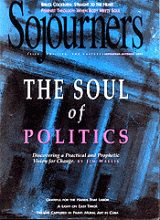Four women sit, faces buried deeply in their hands, visibly anguished. Regardless of the gifts theyve been given and despite Gods call for their lives, the 1994 Synod of the Christian Reformed Church determined that they may not be ordained as elders, ministers, or evangelists.
The caption under the photo of the four women doesnt say if they are among those who now face the wrenching decision of whether to defect to another denomination in order to fulfill their call as ministers. But one neednt be in seminary to grieve the painful blow this decision has dealt the church.
Synods past have said that scriptures teaching on women in office was "ambiguous." Women were permitted to "expound" scripture, but could neither administer the sacraments nor be ordained. Many delegates in past years voted for this half-gesture out of fear of a denominational split, and they deferred to future gatherings the decision on a complete opening of church offices.
This year, the all-male delegates approved a report alleging that scripture "clearly" shows that women are not to teach or be ordained. One delegate bluntly told women that "like it or not, authority in scripture is given to males." In so stating, the church has declared that women are not equal to menthe ramifications of which will affect every person, regardless of their vocational call.
The Christian Reformed Church is proud of its redemptive-historical interpretation of scripture, the belief that individual texts must be interpreted in the context of scriptures central core: the thrust toward redemption. We baptize infants as a sign of Gods claim to their livesnot as a sign that we have received God.
Read the Full Article
